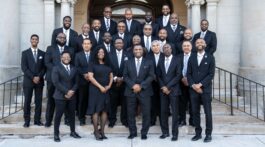“Sixty-five years. Don’t they go by in a blink?” Those are not the words of an Adventist trying to explain the concept “soon.” Those are the words of William Parrish, played by Sir Anthony Hopkins in the 1998 film “Meet Joe Black,” as he prepares for his rendezvous with Death.
My father died in 1974, now more than 40 years ago. It was too soon. He was only 59. Had he lived, he would’ve been 101 years old this February 28. And if he had lived, and died on that birthday, it would still be too soon.
I live every day now with the knowledge that I’m older than my father ever lived to be. It’s a very strange feeling. And I tell you, it seems only yesterday that we worked together, watched football games together, played golf, spoke of things of the heart and soul.
I hope to live for many more years. The actuarial tables tell me that a man my age in North America has about 20 more years to live. Considering how recently it seems that it was 20 years ago, that statistical end point seems very soon, indeed.
I remember vividly when I was 13 years old. Now I have a grandson that age. The fact is that for all of us humans, the end will come soon. For my father, it makes no difference whether Christ had come in 1975, or 400 years from now.
When I was 21, and a teacher in the Illinois Conference, I worked at the summer camp that year. I had the privilege of spending time with Eric B. Hare, the marvelous Adventist missionary and storyteller. In fact, I had the opportunity to ask him for some personal guidance. “I once was young, and now I’m old,” he began. That was but an instant ago in memory. I was young, then. Now, he is gone and I am–no longer young.
Whatever stage of life you find yourself in, if you want to leave a legacy, you had better start soon. Because soon, the sands will run through the hourglass, and your time will be short.
So in human terms, everything of lasting value will come soon.
There is, perhaps, one thing left to be said about soon. We’ve seen that soon is a relative term, not an absolute one, and further, that is relative to the task. We have seen that it is also a matter of perspective; it depends on where you stand. And we’ve seen that human terms, every great work will come to an end soon.
The final consideration is that the word that is used in Scripture can also be translated “quickly.” Quickly has two meanings. The first, we have been examining. Quickly can simply mean soon. But the other meaning is “suddenly.” Understanding “soon” has taken a bit of explaining. But understanding “suddenly” is easy.
We experience suddenly all the time, though sometimes we don’t recognize it. For example, my youngest daughter and her fiancé became engaged while she was still in college and he was still in the Marine Corps. They decided to wait to get married until she finished college and his enlistment was up. That was 18 months after their engagement. For 18 months, they looked forward to and planned for their wedding. It seemed there were thousands of details to be attended to. As with many young lovers, the time they had to wait seemed to drag on. Then the day of their wedding came, and with all the preparations in the getting dressed and the ceremony and the reception — suddenly it was all behind them. Suddenly it was over.
Of course, other things are more obvious. One day, as I was driving to the church school where I taught, the pickup truck just ahead of me was struck by a passenger car. When the officer came to ask me what I saw, I said, just like the stereotype, “It all happened so suddenly.”
Some of you, reading this, planned and toiled for years to earn a college degree, or an advanced degree. Graduation weekend came, you put on your robe, marched down the aisle, received your diploma, and then suddenly, the entire service was over, you had your degree, and life stretched before you. So we do in fact experience this all the time.
I told you that my father died more than 40 years ago. In the late spring of 1973, he was diagnosed with a brain tumor. They operated, and he recovered quickly. We worked together that summer. But late in August, he had a fall, and from then on he continually declined. He lingered for most of the year, and then in 1974, on the Sabbath, I received a phone call. “Dad died this afternoon,” my sister said. It had been months coming. My mother was in denial. I didn’t know what to think. And then, suddenly, it was all over.
And so that is my answer. Whenever Christ comes, we will look back, we will see the enormity of the task that was begun at Pentecost; we will see the efforts of missionaries throughout the ages, the efforts of ordinary Christians to live the gospel as a witness for their neighbors throughout the centuries; we will see the sacrifices made; and we will see that in spite of all that, the work would never have been accomplished without the Holy Spirit bringing the Latter Rain. And then we will understand, it was indeed soon.
And at that time, those looking back, will have survived the final crisis. They will have borne witness under the most trying circumstances. The ordeal will have seemed to go on endlessly, and then suddenly it will be over.
He is coming. Quickly.










